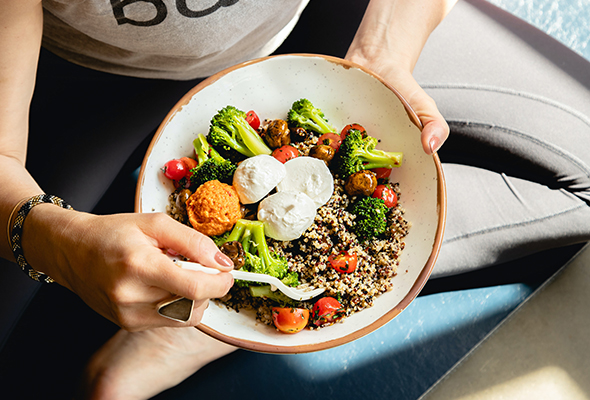
Endurance sports – cycling, running, swimming, triathlon – are gaining more and more supporters. If you are one of them or want to start your adventure with this type of activity, learn more about the diet that can improve your performance.
A properly balanced diet is – next to training – an extremely important aspect of improving the silhouette and building endurance. Only a combination of training and diet will allow you to reach the optimum results – so it’s worth developing the right habits as soon as possible.
In order to perform long-term and intense exercise, our body needs “fuel”. Feeling tired during a workout may mean that an aspect of diet has been neglected – hydration and providing the right amount of carbohydrates. Fatigue is associated with a decrease in training intensity, which in turn leads to poorer results.
Everyone should take care of proper hydration – after all, our body consists mainly of water. Dehydration results in symptoms such as headaches, irritability and coordination disorders. It is assumed that a healthy adult should drink 1.5 to 2 liters of water a day.
In the case of enthusiasts of endurance training (which is long and intense), water consumption should be above average. This is due to the loss of fluids through sweating, so you need to replenish them regularly. Supplements containing electrolytes and other lost nutrients can be added to the water.
Iron may be lost during intense training. Low irons levels result in easy fatigability, poor concentration, shortness of breath, headaches and dizziness. This is not conducive to achieving good results in endurance sports.
First of all, you should make sure your diet is rich in this element. Foods contain both heme iron (absorbed in 20%, present in animal products) and non-heme iron (absorbed in 5%, present in eggs, whole grains, legumes). The richest in iron are offal products and fish (sardines in oil, mackerel, tuna), eggs, sesame, pumpkin and sunflower seeds. In order to ensure the greatest absorption by the body, iron-containing products should not be combined with coffee and tea (due to the presence of tannins and oxalates in these drinks), products containing large amounts of phosphorus and with a large amount of bran, oatmeal, legumes (they contain phytates).
Another important source of iron- after a balanced diet – can be supplementation. If you are a vegan or vegetarian, it will be especially important to avoid negative effects of deficiencies.
Scientific research proves the benefits of a diet rich in carbohydrates for better performance in endurance sports. During intense exercise, the body uses glycogen stores that need to be replenished. In addition, following of low-carbohydrate diets leads to an increase in oxygen demand during training. Carbohydrates therefore constitute the basic “fuel”, allowing you to improve performance, maintain high levels of muscle activity and delay the feeling of fatigue.
Carbohydrate intake guidelines for endurance training programs set it at 6-10 g/kg of total body weight. It is recommended to consume carbohydrates before or during exercise, as well as during post-exercise recovery after the workout.
In order to supplement carbohydrate deficiencies on an ongoing basis (e.g. during marathons), it is useful having a handful of dried fruit or seeds or an energy bar with you.
Supplement Line Vitarage by Fitness Authority is addressed to enthusiasts of endurance sports. It will provide carbohydrate support that will ensure improved performance and make you go beyond your own limits.
daily workout and nutritional advice
to maximise performance
exclusive discounts and offers
Be the first to hear about new products
Fitness Authority® Sp. z o.o.
Konna 40, Otomin – Poland
NIP: 957 103 70 01
KRS: 0000355208
P: +48 58 522-07-56
E-mail: contact@vitarade.com